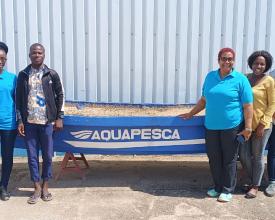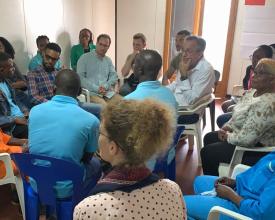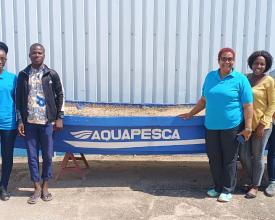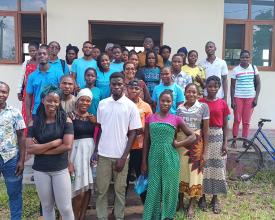
Navigating a Transformative Journey for Diversity and Gender Inclusion in an Aquaculture Enterprise
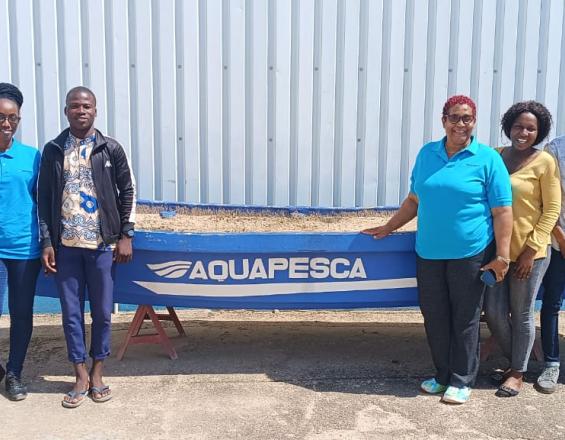
Developing a sustainable blue economy sector in Mozambique should include a gender perspective. The NGO MUVA is working with companies and communities in the blue economy sector on gender-responsive business development and entrepreneurship.
In a pilot with the company Aquapesca, we developed a transformative journey for the company to include more women while also working with local communities. The goal is to develop an inspiring example for other companies in Mozambique and the blue economy sector in general. Inspired by this collaboration, MUVA is now embarking on an in-depth qualitative exploration of diverse profiles of women across various sectors of the blue economy.
Context
Challenges addressed
- Limited gender awareness in blue economy businesses
- Male-dominated sectors
- Social norms and organizational culture that inhibit women’s participation
- Lack of policies and initiatives that allow young women’s inclusion in the workplace
- Lack of familiar alignment and self-confidence to play leadership roles and make decisions about economic opportunities
Location
Process
Summary of the process
A rapid assessment was developed to understand the challenges for greater gender inclusion in the company, as well as the barriers inhibiting women's participation in selection processes and company activities. From this phase, a training path was designed for leadership, staff, and the change makers group to create awareness and develop action plans to address these challenges. The company implemented actions and the MUVA team monitored the entire process to use the data for scaling and positive influence in other organizations.
The project flow design facilitated the strengthening of the partnership between MUVA and the company and built capacities for sustainable change.
Building Blocks
Create awareness and engage the Aquapesca staff in establishing a more gender-inclusive environment
A rapid assessment enabled us to intricately outline the methodological workflow for our collaboration with the company Aquapesca. This workflow began with the formation of the Change Makers Group, working in close tandem with the MUVA team to grasp the methodologies necessary for ensuring the sustainability of our approach within the organization. The Change Makers Group was entrusted with the responsibility of spearheading processes within the organization, ultimately becoming champions of inclusion and gender equality, working in conjunction with colleagues and leadership. Following the group's inception, leadership training was conducted to create awareness and generate initial ideas regarding the areas of focus for action plans with new practices and policies for the company. Subsequently, the Change Makers Group was trained, building capacity for them to facilitate the approval of these plans and mobilize working groups dedicated to each area of work.
Enabling factors
- Engagement of the CEO and other executive leadership members
- Motivation of young people selected to participate in the Change Makers Groups and to lead the process as part of their skills development in career progression
Lesson learned
- The time of staff engagement should be well forecasted at the beginning of the project to guarantee availability and to not overburden them.
- Communicate the needs of the company leadership about the team’s availability and resources.
Establishment and Training of a Change Makers Group
The Change Makers Group at the business partner Aquapesca was formed by seven individuals from different departments. The identification of key individuals for this group was made possible through collaboration between MUVA and Aquapesca's leadership. The rapid assessment of the organizational culture of Aquapesca enabled the team to map those potential champions to participate in the Change Makers Groups. The selected team members were then listed for the approach.
Training and capacity building for the change makers group took place intending to equip the Aquapesca team with the MUVA facilitation methodology, which is grounded in participatory popular education techniques. The training program with the Change Makers Group at Aquapesca had specific objectives designed to empower the group and equip them with necessary skills and knowledge, including a significant component on the gender perspective. This involved a comprehensive review of the concept of gender and an examination of societal norms that shape gender roles and expectations. By understanding these dynamics, participants were better equipped to address gender-related issues in their training and community engagement efforts.
Enabling factors
- Schedule a good time for the training as many staff members have busy schedules and time constraints, making it difficult to dedicate time for participation in gender training.
- Senior facilitators leading the training to guarantee relevant discussions and takeaways to start the design of action plans collaboratively.
- Intense face-to-face training with the Change Makers Group and continuous online and periodic mentoring to monitor development.
Lesson learned
- Be flexible in the training program, offering scheduling and format options that accommodate staff members’ availability.
- Highlight the personal and professional benefits of participating in the training, showcasing how it can contribute to individual well-being and development.
- It is important to invest in the development and empowerment of change agents within the company. By equipping the change makers group with the knowledge and skills necessary to lead internal processes, we established a foundation for sustained change. Their active involvement and commitment catalyze the long-term adoption of gender-inclusive practices and policies.
Action plans – development of practical tools and policies for positive gender change processes
Based on the leadership and Change Makers Group training, participatory action plans were developed. These plans were translated into changes in institutional practices and policies in the following areas: personal and professional development; health and well-being; maternity and paternity; and inclusive leadership. The action plans were collaboratively crafted by the teams and subsequently approved by leadership. This process led to the establishment of working groups comprising diverse members from the company, each responsible for developing the specific details of their assigned actions.
Key results from the action plans within Aquapesca include: changes in the communication of vacancies and recruitment process to encourage the inclusion of women in different work positions; the dissemination of maternity and paternity policies for staff awareness; the improvement of staff equipment for health and safety; new multi-sectorial working groups for more inclusivity in decision making; the creation of a physical mural for inclusive communication about companies key information and opportunities; and the implementation of new activities in the community for better relationship, support and communication.
Enabling factors
- Allocating adequate human and financial resources for action plan implementation; limited resource availability can impact the effectiveness of implementation
- Alignment of the staff ideas with the leadership priorities to guarantee time and resources allocated for the action plan implementation
Lesson learned
- Align the company’s priorities with the action plans related to the gender strategy to have the staff time and financial resources already allocated for the different initiatives. The importance of alignment with the leadership and engagement with them is crucial. Engaging key staff and availability for the strategy is powerful in catalyzing the implementation of the action plans.
- Recognize the importance of flexibility, cultural sensitivity, and effective communication strategies when addressing deeply ingrained social norms.
- Need for a strategic approach to resource management, optimizing the use of limited financial and human resources to achieve maximum impact.
Design and implementation of a community initiative
The community initiative has been designed in a participatory manner, together with representatives from the selected community. Activities included reflective sessions on gender, social roles and work, and local economic opportunities. The format of the sessions was held in a participatory methodology based on MUVA principles.
Interviews with participants after the training sessions revealed that they were perceived as very helpful in promoting a better understanding of gender inclusion. Participants learned different things from what they had in mind and realized that there is not much difference between men and women and that they have the same rights. Responses indicated a transformation in the perceptions of the participants, who have come to recognize and value equal opportunities in business and the breaking down of gender stereotypes associated with commercial activities. These changes indicate a move towards a more inclusive and equitable vision of professions and types of business for men and women.
Enabling factors
- To promote greater gender equality in the community, meetings should be held in a place that allows everyone to participate, where information on the subject can be shared, and participants can clarify any doubts they may have.
- A fun atmosphere was fundamental to the positive impression of participants as well as understanding that the road to gender equality depends on expanding these types of sessions to "change mentalities".
- Previous contact with community leaders is key to getting permission and support for running the initiative in the selected community.
Lesson learned
- Participants highlighted the importance of extending this kind of conversation to older individuals as a means of involving everyone in demystifying gender roles in professions and opportunities.
- The participatory methodology allowed to create an environment for open discussions and the development of communication skills.
- The involvement of community leaders is crucial. Still, it is essential to set and communicate criteria for the selection of participants in an inclusive format with no interference from the leaders, disseminating the opportunity for participation widely and inclusively.
Data collection, reflexion, and adaptation for sustainability with relevant partners
The data collection and ongoing monitoring of the project's achievements were carried out by a dedicated Monitoring, Evaluation, and Learning (MEL) team. This team, external to MUVA, conducted in-depth interviews, focus group discussions, and periodic analysis of each action plan at baseline, midline, and final stages. This systematic approach allowed for comprehensive data collection, culminating in a reflection meeting at the end of the initiative. Facilitated by a senior facilitator, results were presented to the MUVA, Aquapesca, and Pro Azul teams. The meeting provided an opportunity for teams to extract key learnings and formulate a path for scaling and sustaining the initiative.
Enabling factors
- Budget for an external MEL team allocated for the project
- Aquapesca availability to engage in the MEL data collection process
Lesson learned
- As the project is highly innovative and tailored, some of the success indicators are developed during the definition of action plans. Consequently, the MEL team's involvement in mentoring sessions allowed for the creation of indicators aligned with actions and the periodic monitoring of results. This approach promoted motivation and agility in the execution of plans by observing the progress of the initiative.
Impacts
- Behavioral change related to gender equality in the workplace.
- Trainings allowed for profound and interactive discussions and due to the participatory approach, there was enthusiasm and readiness by the company to take the lead in implementing internal plans.
- Design and implementation of action plans to allow better gender inclusion, safety, and well-being in the workplace. Aspects of action plans include, for example, changing vacancy announcements to empower women to apply, talking about the taboo of menstruation and work, or information on maternity and paternity leave laws.
- Better communication flows in the company and interactive multi-sectorial groups for project development.
- One of the project's major accomplishments so far has been the careful selection and comprehensive training of the Change Makers Group comprising seven individuals. These individuals have emerged as dedicated champions of gender equality and inclusion within the company.
Beneficiaries
- The company Aquapesca in the transformative journey for GESI
- Young men and women from the community surrounding the company
- The Pro Azul team staff for participation in the design and analysis of learnings about gender inclusion in the sector
Sustainable Development Goals
Story
Empowering Female Leadership: Fita's Journey from project participant to inspirational role model at Aquapesca
Fita, a young woman working at Aquapesca, was selected to lead the company's Change Makers Group through the project. This role provided her with her first experience in corporative leadership. Through training and mentorship to lead initiatives promoting gender inclusion and equality, she began to take on new responsibilities and inspire colleagues in her circle, ultimately becoming a role model. According to Fita, “This opportunity developed communication, negotiation, and active listening skills”. In her words, ‘‘I no longer feel nervous to take action; I am motivated to pass on the working methodology we learned in the project, I already can see the impact of this in my team, people talk, take responsibility and act together”.
